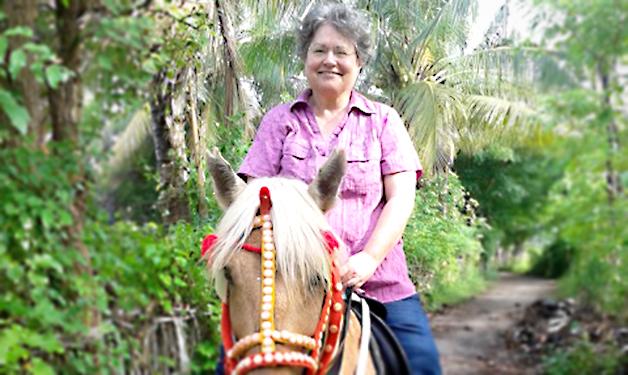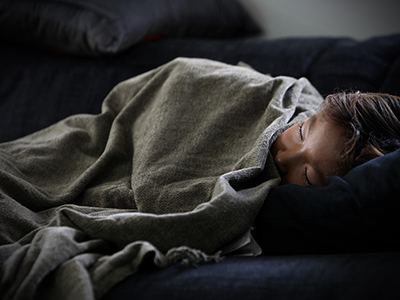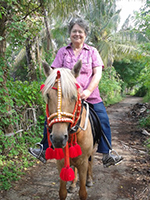
“I say yes to research because I think it is the only way that medicine moves forward.”
– Carlie Trueman, Vancouver
Without hesitation, Vancouver resident Carlie Trueman describes myalgic encephalomyelitis/chronic fatigue syndrome (ME/CFS) as “the condition from hell.” For three of the 15 years that she has been sick, she was unable to get off the couch, pay bills, or even go out and buy groceries.
“I was absolutely non-functional,” shares Trueman, who is now in her sixties. “Why I wasn’t in some sort of care facility is a bit beyond me—that’s how bad it was.”
To make matters worse, her family doctor had moved to another town and she did not have the ability to find another doctor. Her lawyer found another general practitioner (GP), which jumpstarted a process of referrals to specialists and incorrect diagnoses.
“I recognized that the specialists were diagnosing me mainly by guessing what might be wrong, as determined by their specialty,” Trueman says.
"My GP thought I had a remarkable number of horrible conditions,” says Trueman. “I said, ‘No I don’t have these things. I have something that relates all of these things together.’”
Trueman’s experience with clinicians unsure of how to recognize or diagnose ME/CFS is not uncommon.
“Unlike most chronic disease processes, ME/CFS doesn’t have an established pathophysiology or a biomarker,” explains Dr. David Patrick, professor and director with the School of Population and Public Health at the University of British Columbia and Vancouver Coastal Health infectious diseases consultant. “It’s diagnosed based on symptoms of profound fatigue—particularly fatigue that gets a lot worse after exertion—and it’s often accompanied by other symptoms like body pain and the inability to concentrate. These often sound pretty non-specific to most people and yet when you take a look at people with ME/CFS they have a level of disability that equals that of any other chronic disease that’s diagnosed on criteria.”

Dr. Patrick is leading a series of clinical studies to observe what makes ME/CFS patients suffer from these symptoms. The second study currently underway, “Exploring Host Gene Expression during Post-Exertional Symptom Flare in ME/CFS: An experimental approach: The CPET study” looks at ME/CFS patients when they are relatively well, in a rested state, and compares that to when they undergo a profound crash after exercising. The study aims to take advantage of newly available technologies that allow researchers to look at ME/CFS patients in ways that have not been possible before.

“By looking at differences when people feel sick compared to when they’re feeling well, we hope to see some biological pathways that might explain the ME/CFS symptoms," explains Dr. Patrick. And we’re doing the same kind of testing in healthy people who do not exercise regularly so they have a similar exercise background as the ME/CFS participants.”
“If we can better understand why people are feeling tired in ME/CFS and what biological pathways are at play, this will lead to options for discovering treatments that we have not imagined before,” Dr. Patrick says.
While these studies may not produce the definitive answer to what causes ME/CFS, Dr. Patrick sees them as essential to providing new observations that may allow researchers to ask the right questions in the future.
For Trueman, being part of the clinical study and meeting Dr. Patrick and his research team has helped her far more than her encounters with well-meaning family physicians and specialists.

Trueman's sense of recovery is atypical for most people suffering from ME/CFS. Because she asked to have her test results from the studies, Trueman was able to get information that was specific to her. The most reassuring part of her clinical study experience was receiving a differential ME/CFS diagnosis and ruling out conditions and diseases that may have been causing her symptoms.
While her participation in the study has benefitted her personally, she also feels it has been an opportunity to help people who may suffer from ME/CFS in the future.
“I thought: I can’t contribute anything to the society in which I live unless I participate in such research,” she says. “That’s the one thing I can do to help people and be of value.”
THIS IS ONE PATIENT’S STORY OF PARTICIPATING IN A CLINICAL TRIAL. YOUR EXPERIENCE MAY DIFFER. LEARN MORE ABOUT CLINICAL TRIALS BEFORE PARTICIPATING.


